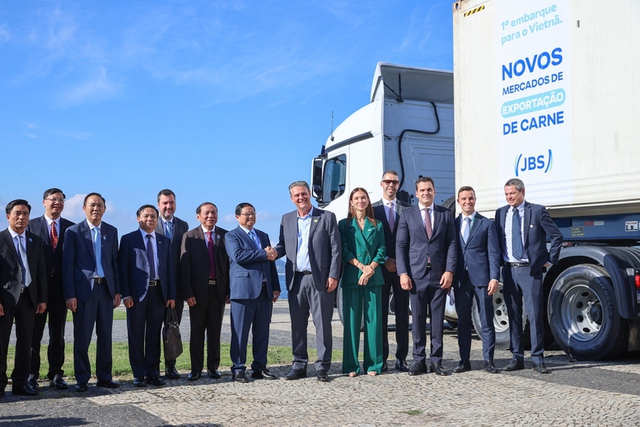Viet Nam, Brazil should work to build coffee brand
VGP - Prime Minister Pham Minh Chinh suggested Viet Nam and Brazil should work together to develop a joint coffee brand during his meeting with Brazil's Minister of Agriculture and Livestock Carlos Fávaro in Rio de Janeiro, Brazil, on July 5.

Prime Minister Pham Minh Chinh and Brazil's Minister of Agriculture and Livestock Carlos Fávaro at a ceremony to witness the first container of Brazilian beef exported to Viet Nam, Rio de Janeiro, Brazil, July 5, 2025 - Photo: VGP
Pham reiterated that the two countries have great potential to develop agricultural cooperation thanks to their large markets, complementary strengths, and future free trade agreements.
The Prime Minister expressed his belief that the outcomes of his visit will open up a new era of agricultural cooperation between the two countries, making agriculture a breakthrough sector in the bilateral ties.
Pham urged the two agriculture ministries establish a joint task force to implement high-level commitments, including further opening markets for each other's key agricultural products, promoting local agricultural investment and forming a food security partnership under which Viet Nam will supply rice to help ensure Brazil's food security.
Fávaro, for his part, hailed Viet Nam's long-standing agricultural tradition and the growing international competitiveness of its agricultural products, expecting to deepen bilateral agricultural ties, recognizing it as a key pillar of the newly established Strategic Partnership.
He affirmed his readiness to exchange lists of each side's key agricultural products in order to jointly develop a roadmap for market access for both countries' agricultural goods.
He expected to enhance connectivity between Vietnamese and Brazilian agricultural enterprises and build trade and investment partnerships that are integrated and complementary across the agricultural production chain and boost exchange and transfer of machinery, equipment, and processing technologies to help improve quality of agricultural products in both countries.
The occasion, the Vietnamese Prime Minister and the Brazilian Minister joined a ceremony to witness the first container of Brazilian beef exported to Viet Nam.
The Prime Minister affirmed that this event, along with Viet Nam's first export shipment of pangasius, basa, and tilapia to Brazil, stands as a testament to the close, reliable, and mutually beneficial agricultural cooperation between the two countries, serving as a driving force for further strengthening collaboration in the time ahead./.
